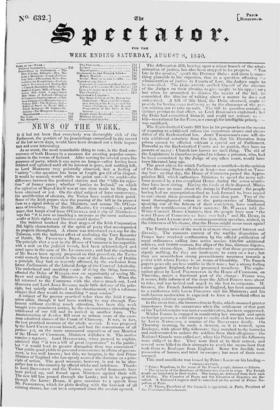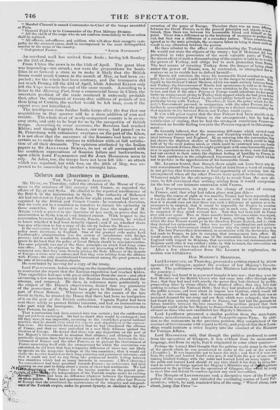NEWS OF THE WEEK.
IF it had not been that everybody was thoroughly sick of' the Parliament, the portion of its proceedings comprised in.the record of the last seven days, would have been deemed not a littleimpor taut and even interesting. • As an event, the most remarkable thing to note, is the final concurrence of both Houses in a measure for creating popular corporations in the towns of Ireland. After serving for several years the purposes of party, which it can serve no longer—after having been debated and agitated until all its interest is gone, and nothing left, as Lord MORPETII very pointedly observed, but a feeling of "satiety "—the question has been at length got rid of in disgust. It would be scarcely worth while to point out—it' we could—the difference between the perfected statute and the " hills for rejection" of former years ; whether "justice to Ireland," on which the agitation of Repeal itself was at one time made to hinge, has been obtained or not. On the chief subject of later controversy, the qualification of electors, the Tories have carried their point. Some of the Irish papers view the passing of the bill in its present form as a signal defeat of the Ministers, and accuse Mr. O'CosNsis, of treachery. The Dub/in Monitor, for example—a patriot paper,that keeps aloof from O'CONNELL and is shy of Al inisterssays that " it is now as insulting a measure as the most audacious scoffer at Irish rights and liberties could desire." One incident marked the final stages of the Irish Corporation Bill, highly characteristic of the spirit of party that accompanied its progress throughout. A clause Was introduced as a sop for the 'foilsmen, with the indirect effect of excluding the Tory Recorder of Dublin, Mr. FRMWRICa SHAW, 11'0111 sitting in Parliament. The principle that a seat in the House of Commons is incompatible with a seat on the judicial bench, had been acknowledged and acted upon in the case of Dr. Lusnisarrox ; and had the exclusion of Mr. SHAW been openly proposed on that precedent, the Tories could scarcely have resisted in the case of' the Recorder of Dublin a principle they had so recently affirmed, by the exclusion from future Parliaments of the Liberal Judge of tile Court of Admiralty. The underhand and sneaking i.tode of doing the thing, however, afforded the Duke of WELLINuTON an opportunity of saving Mr. Susw and scolding the Ministess at the same time. When the bill returned to the Commons with the clause struck out, Lord MORPETU and Lord Jon N Itessms, made little defence of' the principle, but quietly submitted to the chastisement, with a valorous whisper that they would do something " next session." • A subject of for greater practical value than the Irish Corporation affidr, though it had been working its way through Parliament without exciting much attention, has been this week brought into prominent notice, by the circumstances attending the withdrawal of one hill and its revival in another form. The Administration of Justice Bill went to reform some of the enormous admitted abuses of the Court of' Chancery. It was, in fact, the best practical measure of the whole session. It was proposed by the Lord CIFANC rd.y.oft himself; and had the concurrence of' all parties : yet, on the mere announced opposition of one Member of the House of Commons, ;Ministers withdrew it. The motive remains a mystery. Lord 'MELBOURNE, when pressed to explain, admittsd that " it was a bill of great importance" to the public ; but "it would lead to greater discussion than was convenient." I hat public good yields to personal convenience in affairs of govern ment, is too well known ; but this, we imagine, is the first Prime Minister.of England who has openly avowed the doctrine as a prin ciple of action. The good measure, however, is not to be alto gether lost to the country by official tricks and indolence. Thanks to Lord BROUGHAM and the Tories, some useful fragments have been picked up, and forced upon Ministers against their will. I he new bill has passed through the Lords; and in its progress through the Lower House, it gave occasion to a speech from Mr. l'EMBERTON, which for plain dealing svith the heaviest of all existing abuses, has not been surpassed since the session opened. The Affirmation Bill, bearing upon a minor branch of the administration of justice, has also been stopped in its progress. " Too late in the session," quoth the Dictator Duke : and there is something plausible in his objection, that in a question affecting ;So administrntion of justice in Courts of Law, the Judges ought to be consulted. The Duke adroitly availed himself of the absence of the Judges on their circuits, to give weight to his oppoti,ion ; but when he attempted to discuss the merits of the bill, he committed the blunder of talking about a matter he does not understand. A bill of this kind, the Duke observed, ought te provide fn. having some testimony as to the character of' the person wishing not to take an oath. The bill in question contains a distinct proviso to that effect, as Lord Baocausm explained; but the Duke had committed himself, and could not retract : so bill—too rational for the Peers, not enough for intelligible princips_ — was sacrificed. 'rime Ecclesiastical Courts Bill has in its progress-been the means of exposing to additional odium the monstrous abuses and absardities of the Ecclesiastical law. Joins Tnononoon's case will obtain additional notoriety from the fact, that his liberation from prison cannot be effected without a special act of Parliament. Powerful as the Ec‘clesiastical Courts are to punish, they have no powers of mercy : Church law knows no such thing. The aid of the Legislature is therefore required to release a prisoner, who, had he been committed by the Judge of any other court, would have been liberated long ago. The great object for which Parliament assembled—in the opinion of the Downing Street officials at least—was completed on Tuesday last : on that day, the House of Commons passed the Appropriation Bill, which authorizes :Ministers to spend the many millions granted by a too compliant House during the seven months they have been sitting. Having the funds at their disposal, Ministers will care no more about the doings in Parliament : the people having had no appropriation-fund to look forward to, have ceased to care about these proceedings for some time past. Two of the most thoroughpaced voters at the party-service of Ministers, speaking out of the fulness of their conviction, have confessed aloud the worthlessness of their masters: Mr. WA IS LEY told the White Conduit House Chartists, that the people have now "the worst House of Commons we have ever had ;" ana Mr. Huai; in rivaling Lord Lvisoneust's session-peroration speeches, wished, in the bitterness of his shame, that the House might never meet again!
The Foreign news of the week is of mare than usual interest and diversity. The rumours current of the warlike disposition of France have received confirmation by the official publication of royal ordinances calling into active service 150,000 additional soldiers, and 10,000 seamen, five ships of the line, thirteen frigates, and nine stuam-ships. Anti-alarmists say that these preparations signify nothing, for they are inadequate to carry on a war; but they are nevertheless strong precautionary measures towards a power with whom France is on terms of' friendship. The French papers generally are less warlike in their tone ; but a strong feeling exists against England, for her presumed treachery. The explanation given by Lord PALMERSTON in the House of Commons, on Thursdbay, meets a fractional part of the charge: France was, it seems, fully informed of' the steps the Allied Powers were about to take, and was invited and urged to the last to cooperate. M. Gesso; the French Ambassador in England, has been summoned to a conference with Louis PiniareE and his Ministers; and his well-known moderation is expected to have a beneficial effect in smoothing existing asperities. ln the mean time, the insurrection in Syria, which assumed greater importance from its occurrence when the settlement of that part of the Turkish empire was under consideration, has been suppressed. Whilst France is engaged in manifesting her strength anti spirit to foreign powers, a wild attempt to excite civil war has been made by Loris NAPOLEON a maniac of the liosArmern family. On 'Thursday morning, fie made a descent, as it is termea, upon Boulogne, with about. fifty followers: they marched to the barracks and endeavoured to seduce the soldiers from their allegiance: the Nat ionnl Guards were called out, when the Prince and his followers were obliged to flee. They were fired at in their retreat, and several were killed in their attempts to reach the steam-boat that took them to Boulogne from England. Some few forcibly took possession of horses, and tried to escape ; but most of them were secured. This mad manifesto wasissued by Prince Louison his landing" PROCLAMATION.
" Prince Napoleon, in the name of the French pople, decrees as follows. " The dynasty of the Bourbons of Orleans has ceased to reign. The French people are reinstated in their rights. The troops are delivered from their oath of fidelity. The Chamber of Peers and the Chamber of Deputies are dissolved. A National Congress shall b convoked on the arrival of Prince Napoleon at Paris.
M. niers, President of the Council, is appointed, at Paris, President of the Provisional Coverinnent.
" Marshal Claussel is named Commander-in-Chief of the troops assembled at Paris.
" General Pisjol is to be Commander of the First Military Division. " All the chiefs of the corps who do not conform immediately to these orders shall be replaced.
" All officers, sub-officers, and soldiers, who Yill Shaw their energetic sympathy for the national cause, shall be recompensed in the most distinguished manner in the name of the country. " God protect France. "Louis NArOLEON."



























 Previous page
Previous page